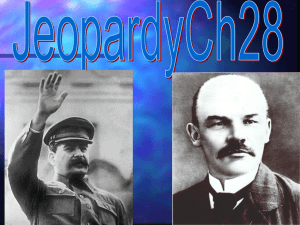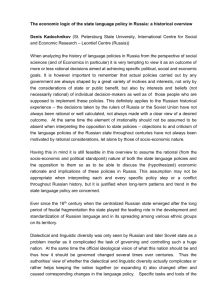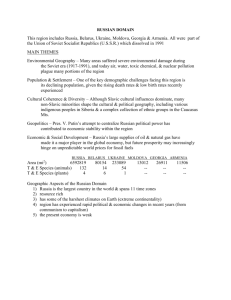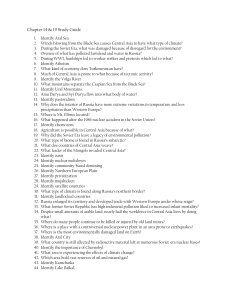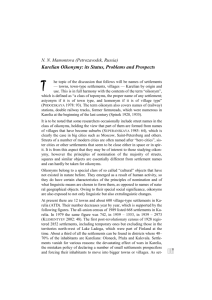2011 SDS Presentation Summary and Useful Terms List Title
advertisement
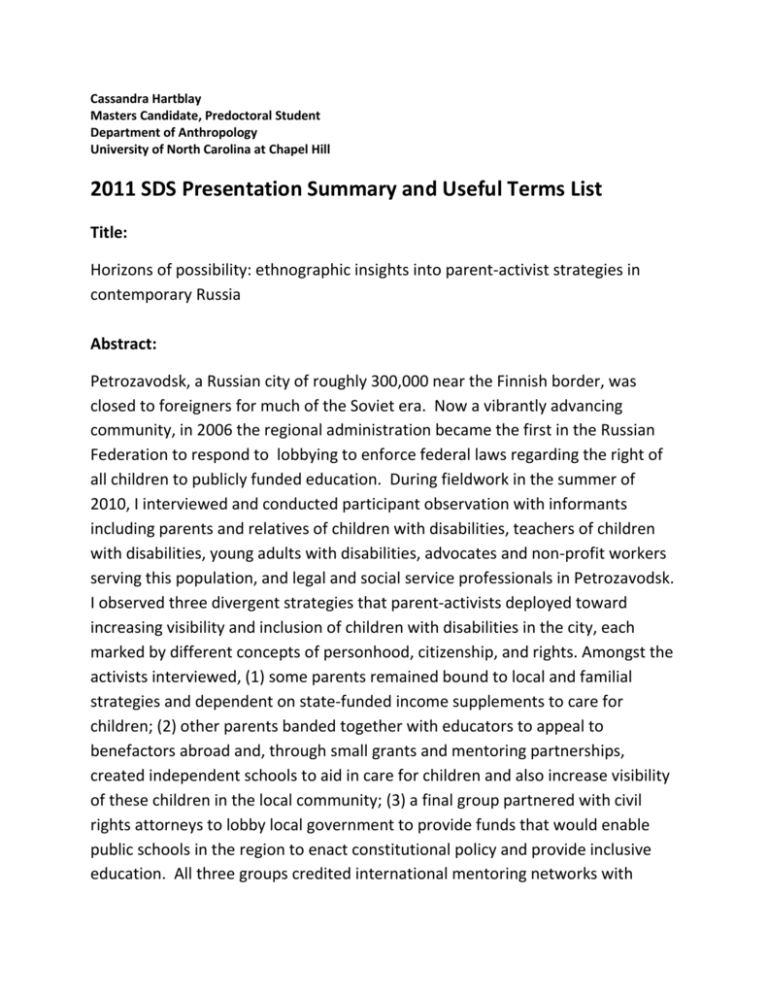
Cassandra Hartblay Masters Candidate, Predoctoral Student Department of Anthropology University of North Carolina at Chapel Hill 2011 SDS Presentation Summary and Useful Terms List Title: Horizons of possibility: ethnographic insights into parent-activist strategies in contemporary Russia Abstract: Petrozavodsk, a Russian city of roughly 300,000 near the Finnish border, was closed to foreigners for much of the Soviet era. Now a vibrantly advancing community, in 2006 the regional administration became the first in the Russian Federation to respond to lobbying to enforce federal laws regarding the right of all children to publicly funded education. During fieldwork in the summer of 2010, I interviewed and conducted participant observation with informants including parents and relatives of children with disabilities, teachers of children with disabilities, young adults with disabilities, advocates and non-profit workers serving this population, and legal and social service professionals in Petrozavodsk. I observed three divergent strategies that parent-activists deployed toward increasing visibility and inclusion of children with disabilities in the city, each marked by different concepts of personhood, citizenship, and rights. Amongst the activists interviewed, (1) some parents remained bound to local and familial strategies and dependent on state-funded income supplements to care for children; (2) other parents banded together with educators to appeal to benefactors abroad and, through small grants and mentoring partnerships, created independent schools to aid in care for children and also increase visibility of these children in the local community; (3) a final group partnered with civil rights attorneys to lobby local government to provide funds that would enable public schools in the region to enact constitutional policy and provide inclusive education. All three groups credited international mentoring networks with helping to develop workable local strategies, but each group engaged differently with local and national institutions. This paper engages conversations about global disability advocacy movements by providing a case study from the second world, and speaks to questions from Russian studies about citizenship in the New Russia. Key words: disability, Russia, inclusive education, social movements, civil society, globalization, grassroots activism, motherhood Jargon and other specialized terms: Ethnographic research – This term references a particular way of researching and learning about human communities that is key to Cultural Anthropology as a discipline. It is a kind of qualitative research, meaning that it is based on experience and interpretation, rather than on quantitative, or statistical, measures. An ethnographer conducts long, open-form interviews with human research subjects, spends time getting to know the people and the place she or he is studying, and often participates in the daily life of the community. Ethnographic research results in written accounts, or ethnographies, that attempt to describe or translate the experiences of the community being studied to people outside of that community. Postsoviet Russia – The phrase postsoviet underlines the particular cultural formation that follows the collapse of the Soviet Union in 1991. The Soviet Union was an enormous political entity, with territories spanning the European continents, from the Japanese borders in the East, into Central and Northern Europe in the West, and from the North Sea in the polar North to much of Central Asia in the South. Centered in Moscow, the Soviet Union was born out of the 1917 Russian revolution, with the goal of building a people’s republic that strove for a communist future that glorified a technologically advanced industrial labor force, the working citizen, and the collective good. Following the cruelties of Stalinist repression in the 1930s, instability of the centrally planned economy throughout the 20th century, brutal loses in World War II, isolation and stagnation during the Cold War, and the upset of democratic reforms in the 1980s, the Soviet Union collapsed, splitting into numerous separate states, the largest and most prominent of which is the Russian Federation. The regions of the former Soviet Union (the so-called ‘second world’) share a set of historical factors (including the transition in the 1990s to market economies and democracy, a Moscow-centered universe, Russian as the lingua franca, the aftermath of complete political revolution, and a memory of living socialism) that set them apart from either the West or the Global South. Grassroots movement – I use this term to emphasize a home grown political movement, undertaken by common citizens, responding to local problems by looking for viable solutions at local, regional, national and international levels. For example, the parents in Petrozavodsk, Russia are only looking to solve the problems that they are facing, not to make changes on the national scale. This is particularly in contrast to a lot of politics about “rights” that include professional lobbying on a national and international level. Transition discourses – A term used by anthropologists of postsoviet Europe to describe the way that news media, politicians, and many political scientists and economists tend to talk about the changes that have occurred in that region since the end of the Soviet Union. Anthropologists use this phrase to emphasize the fact that by focusing on a “transition” from socialism to capitalism, and Soviet autocracy to democracy, much of what is happening on the ground has been missed, obscured by these binaries (see for example: Lemon 2008, Yurchak 2006, Caldwell 2004). Global assemblages and deterritorialized localities – academic phrases derived from the work of Deleuze and Guattari (1972), that emphasize a manner of understanding the world that tries to get around the tendency to consider the most powerful ideas and regions to be the most relevant or real. For example, to think about the way that Malaysian factory workers see their daily work as being equally important and equally correct as the way that the American corporation that owns the factory sees their daily work (Ong 1988; 2005). Diverse economies – An idea put forth by the authorial duo J.K. Gibson-Graham, that, instead of always looking to the hegemony of market capitalism to explain socio-political phenomena, scholars ought to attend to the ways that noncapitalist practices (including collectivist practices, barter economies, educational investments, etc.) make up much of our economic lives. In the context of this paper, the idea also challenges us to look beyond the binary of socialism/capitalism. Proper Nouns: Petrozavodsk – A city in Northwestern Russia. The name is a combination of Russian words meaning “factory of Peter”, in honor of Peter the Great (19th century Tsar), who established the city as an ammunition factory to supply his Saint Petersburg based Navy. The city is now the capital of the region of Karelia. Karelia – A region of the Russian Federation, north of Saint Petersburg, that borders Finland. The land is distinguished by great swaths of forest and many lakes that remain largely undeveloped, with scattered villages and small cities. Historically the territory has changed hands between Russian and Finnish rule, with a mixed ethnic heritage. Today, Karelia is a political administrative region of the Russian Federation (like an American state) that is known for its progressive government, developing economy, and close cultural and geographic ties to Northern Europe. Internati – The Russian word for residential rehabilitation centers where children with special needs have historically been sent. The quality of life and services of internati varied tremendously, and were largely dependent on the vision and leadership of the local director. Some internati have, in the past 20 years, worked to update their rehabilitative models with the best international practices; others remain little more than near orphanages that feed, cloth, and minimally entertain toddler through 18 year old Russians who are not expected to ever join their communities. During the Soviet era, parents were strongly advised to leave children with disabilities in internati and only visit occasionally, if at all. Many parents today look for other solutions or compromises, like going to stay at internati seasonally or building more localized schools and rehab centers so that children can live at home with their families and still receive services. Names: Katya, Nina, Sveta, Lilya, Oleg, Nastya – Russian first names that I use in telling the stories of the community that I researched in Petrozavodsk. These are not the real names of the people that I talked to (I have changed their names to other common names to protect their privacy). David Mitchell and Sharon Snyder – disability studies scholars Tom Shakespeare – a disability studies scholar Aihwa Ong – a critical cultural anthropologist J.K. Gibson-Graham – a pen name shared by feminist economic geographers Julie Graham and Katherine Gibson
